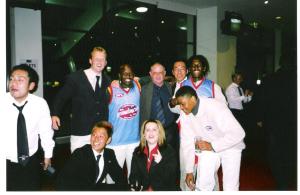 30 August 2005
30 August 2005
By Phindile Khambule
It is really unbelievable how the South African Buffaloes impressed everyone in Melbourne, Australia with their improvement in the International Cup 2005.
In the past International Cup(2002), the Buffaloes finished in last position with no wins at all. But this time it was a different story, last was not going to be acceptable! They pushed themselves to the eigthth position with two wins against Japan & Spain. The win against Japan marked the first time South Africa were victorious in an International match.
Even though the Buffaloes lost four games, other countries would support me on saying that “It wasn’t easy to beat the Buffaloes, they were really fighting for the ball.” This will defanetly go into AFLSA’s history books.
Mtutuzeli Hlomela(Captain) was elected for the second time, and Steven Malinga to be on the International cup’s dream team. Garry Learmonth(Former development Officer in South Africa) and His fiancee donated a trophy for the player’s player award. The team voted for the best player after each game and the winners for each round were as follows:
1st vs USA – Kobus Smit and Lebogang Sekete
2nd vs Japan – Wilco Jonker and Odin Williams
3rd vs Ireland – Julian Horn
4th vs Spain – Wilco Jonker
5th vs Samoa – Andries Mangweng
6th vs Canada – Bryan Mitchell
Unfortunately only one player from the above players had tto take the trophy homee and the lucky player was Wilco Jonker. This was really a huge experience and even an unforgetable moment for everyone.

 Sport often generates great stories of people rising above adversity. This
Sport often generates great stories of people rising above adversity. This is one such story, following the journey of a young South African from a dead-end path on the streets of Itsoseng to a scholarship in the South Australian Riverland and representing his country in Melbourne at the Australian Football International Cup.
is one such story, following the journey of a young South African from a dead-end path on the streets of Itsoseng to a scholarship in the South Australian Riverland and representing his country in Melbourne at the Australian Football International Cup.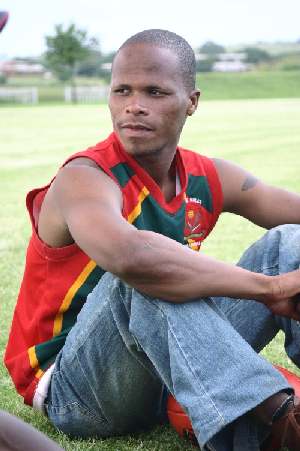 told myself that I will educate myself and help my family\”. He soon began representing his school and province in running, but it was in 1998 when an Australian Defence Force group toured the area, introducing Australian Rules football, that the young South African found his calling. Soon the best players had been selected and were flown to Canberra for the Jim Stynes Cup, an Aussie Rules tournament to promote the game amongst juniors around the world (it has since become the Barassi International Australian Football Youth Tournament). To travel to Australia was an opportunity that the young boy from Itsoseng could not have dreamed of, yet two more trips would follow.
told myself that I will educate myself and help my family\”. He soon began representing his school and province in running, but it was in 1998 when an Australian Defence Force group toured the area, introducing Australian Rules football, that the young South African found his calling. Soon the best players had been selected and were flown to Canberra for the Jim Stynes Cup, an Aussie Rules tournament to promote the game amongst juniors around the world (it has since become the Barassi International Australian Football Youth Tournament). To travel to Australia was an opportunity that the young boy from Itsoseng could not have dreamed of, yet two more trips would follow.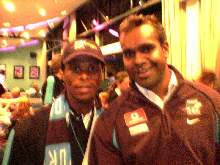 Benji arrived in Adelaide in late June and travelled to Lyrup with Betty for the three month scholarship. He was quickly training and has begun playing for the Lions in the Riverland Football League. In his first game he played on the wing and was named fourth best in a narrow loss. The rollercoaster ride continues, as in his short stay he has also been to see Port Power defeat Melbourne before a crowd of 28000 at AAMI Stadium and attended the after match function where Port coach Mark Williams offered him the chance to experience a training run with the club. Benji has already watched an Adelaide Crows session, and will be involved in Auskick clinics and learning about the day to day running of the Lyrup club. He’s pictured at left with his favourite player, the Power’s Byron Pickett.
Benji arrived in Adelaide in late June and travelled to Lyrup with Betty for the three month scholarship. He was quickly training and has begun playing for the Lions in the Riverland Football League. In his first game he played on the wing and was named fourth best in a narrow loss. The rollercoaster ride continues, as in his short stay he has also been to see Port Power defeat Melbourne before a crowd of 28000 at AAMI Stadium and attended the after match function where Port coach Mark Williams offered him the chance to experience a training run with the club. Benji has already watched an Adelaide Crows session, and will be involved in Auskick clinics and learning about the day to day running of the Lyrup club. He’s pictured at left with his favourite player, the Power’s Byron Pickett. Melbourne in early August, Benji has been named vice captain, behind Mtutuzeli Hlomela, another player with South Aussie connections. \”Mtutu\” spent a season with SANFL club Sturt in the under 19s back in 1998, also on a scholarship. From this contribution by the Double Blues 7 years ago, Mtutu has gone on to develop silky skills, founded a club in Soweto, and will take over as national coach for the Buffaloes when Steve Harrison finishes his work with AFL South Africa after the International Cup.
Melbourne in early August, Benji has been named vice captain, behind Mtutuzeli Hlomela, another player with South Aussie connections. \”Mtutu\” spent a season with SANFL club Sturt in the under 19s back in 1998, also on a scholarship. From this contribution by the Double Blues 7 years ago, Mtutu has gone on to develop silky skills, founded a club in Soweto, and will take over as national coach for the Buffaloes when Steve Harrison finishes his work with AFL South Africa after the International Cup.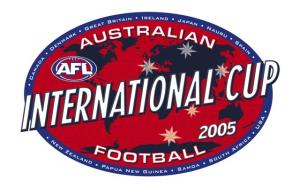 June 29 2005
June 29 2005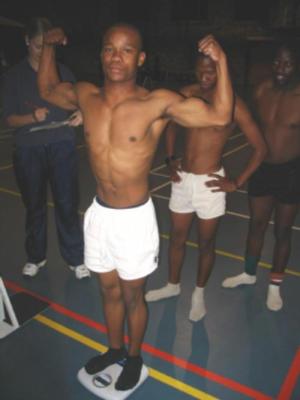 By Steve Harrison
By Steve Harrison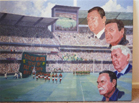 Ron Barassi, Kevin Sheedy, Grant Thomas and Brian Dixon (Chair, AFL South Africa) have joined forces in an attempt to raise funds for AFL South Africa.
Ron Barassi, Kevin Sheedy, Grant Thomas and Brian Dixon (Chair, AFL South Africa) have joined forces in an attempt to raise funds for AFL South Africa.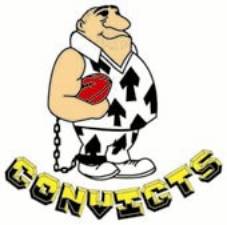 January 14, 2005
January 14, 2005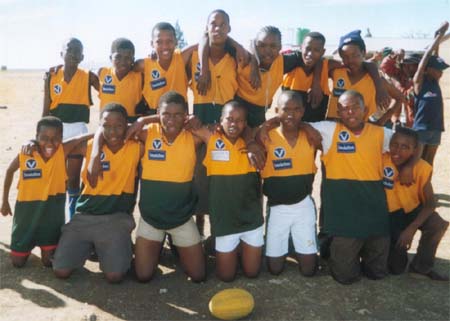 Friday 14th January 2005
Friday 14th January 2005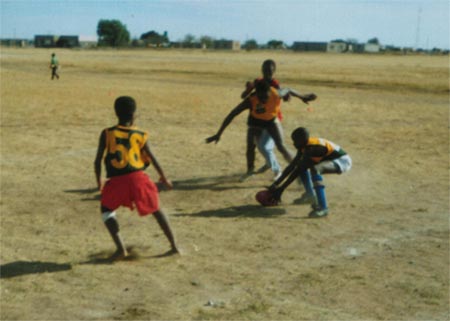
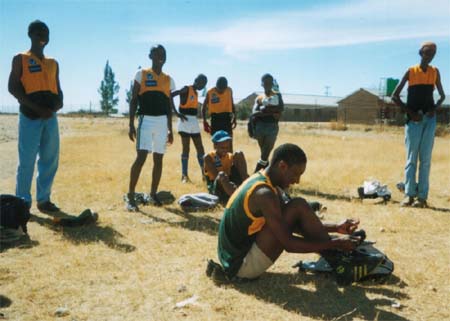
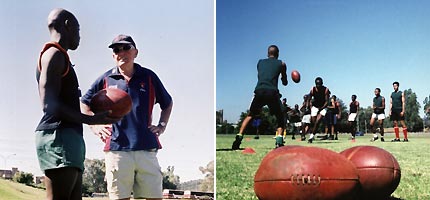 April 24, 2004
April 24, 2004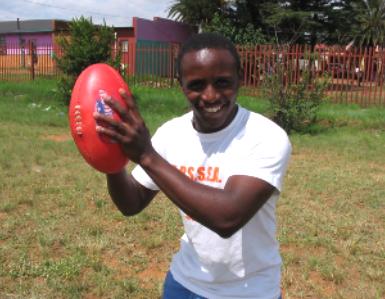 By Steven Harrison.
By Steven Harrison.